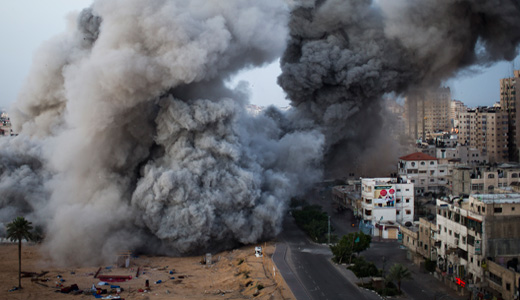
As rocket fire continued between Israel and Gaza’s Hamas-led government Nov. 19 and Israel continued to threaten a land invasion, United Nations Secretary-General Ban Ki-moon arrived in Cairo to participate in ceasefire talks initiated by Egypt’s government.
In parallel talks, Egyptian mediators are meeting with leaders of Hamas, Islamic Jihad, Fatah and other Palestinian organizations, and with Israeli officials, in an effort to broker a lasting resolution in the longstanding conflict. Egyptian President Mohamed Morsi and Turkish Prime Minister Recep Tayyip Erdogan are also participating in the talks.
Hamas leader Khaled Meshaal told reporters that for Gaza’s government to accept a cease-fire, Israel must stop its air strikes first and lift the blockade it imposed in 2007.
The Palestinians are also demanding an end to Israeli incursions into Gaza, an end to assassinations of Palestinian leaders and a permanent freeze on attacks against fishermen off the coast.
Israel, in turn, is reportedly asking for a 15-year halt to the fighting, including an end to all rocket attacks, “terrorist attacks” launched from Gaza and smuggling of weapons into Gaza.
Meanwhile, Israel’s air and sea bombardment of tiny 141-square-mile Gaza was continuing, with Gaza’s health ministry saying the death toll now tops 100 – about half of them civilians – including 24 children. Among Israeli targets was a complex in Gaza City housing international media.
Among Palestinian casualties were nine members of the al-Dalou family. Israeli officials claimed the bomb that struck their home was aimed at a senior Hamas leader.
Hundreds of rockets have been fired from Gaza onto Israel, with three Israeli deaths reported so far.
The current weeklong upsurge in rocket fire began after an Israeli airstrike assassinated Hamas military leader Ahmad al-Jaabari on Nov. 14. Jaabari had been the lead negotiator in the release of Israeli soldier Gilad Shalit, and reportedly had been involved in arranging a short-lived truce in the days immediately before his death.
Besides the air and sea assaults, Israel has massed 75,000 troops on the Gaza border, amid speculation about an imminent invasion.
A poll published this week by the center-left Israeli newspaper Ha’aretz found most Israelis supporting the air strikes but only 30 percent supporting a ground offensive.
Administration officials said President Barack Obama had spoken by phone with Israeli Prime Minister Benjamin Netanyahu and Egyptian President Morsi, expressing condolences for the loss of Israeli and Palestinian lives, and emphasizing the need to de-escalate the conflict. The administration has also said Palestinian rocket fire into Israel must end, and Israel has the right to defend itself.
The Gaza Strip, established in 1948, has been continuously controlled by Israel since 1967, despite the 2005 withdrawal of Israeli settlements and troops, and is considered by the United Nations, the European Union and the United States to be under Israeli occupation.
In a statement issued this week, the American Friends Service Committee said the current situation bears “a striking resemblance” to past Israeli military offensives including the 2008 Operation Cast Lead, in which over 1,400 Palestinians were killed and homes and infrastructure devastated.
The AFSC urged an end to violence by both sides, immediate efforts by the U.S. and international community for a cease-fire, an immediate end to the blockade, and an end to U.S. military aid to Israel.
The Communist Party USA called on the Israeli government to stop escalating the conflict and pull back from sending in ground troops. The CPUSA also urged the U.S. to press Israel to stop further attacks in Gaza and return to serious negotiations toward a two-state solution meeting the aspirations of the Palestinian people.
And J Street, which calls itself “the political home for pro-Israel, pro-peace Americans,” called on President Obama “to step forward … with a bold new effort to resolve this conflict.”
Photo: Smoke rises after an Israeli forces strike in Gaza City, Nov. 18. The Israeli military widened its range of targets in the Gaza Strip to include the media operations of the Palestinian territory’s Hamas leaders, sending its aircraft to attack two buildings used by both Hamas and foreign media outlets. Bernat Armangue/AP

MOST POPULAR TODAY

Zionist organizations leading campaign to stop ceasefire resolutions in D.C. area


High Court essentially bans demonstrations, freedom of assembly in Deep South

Afghanistan’s socialist years: The promising future killed off by U.S. imperialism

Communist Karol Cariola elected president of Chile’s legislature






Comments